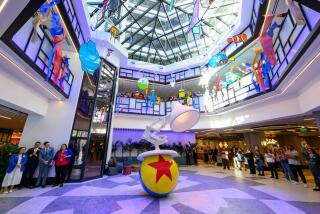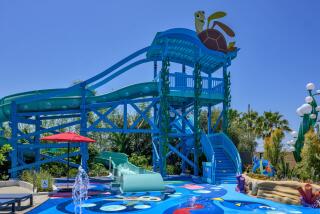Shanghaiâs Peninsula Hotel harks back to cityâs âParis of the Eastâ days
Paul Tchen, general manager of Shanghaiâs Peninsula Hotel, was catching his breath. The hotel, which had had its soft opening only a month earlier, was running smoothly, Tchen a little less so: He had just noticed that his suit jacket and pants didnât match.
Tchen, a Cal Poly Pomona graduate formerly with the Beverly Hills Peninsula, had more important things on his mind: the challenge of opening a luxury property amid the global recession and the high expectations for this Peninsula, the first new structure on Shanghaiâs storied riverfront Bund since the Bank of China in 1927.
The grand opening â a gathering of 4,000 guests from around the world â is set for Friday. For Peninsula, this is a homecoming. Its corporate parent, Hong Kong & Shanghai Hotels Ltd., started in Shanghai in 1866 and once operated four hotels here, the last closing in 1949. In recent years, high-end competitors such as the Four Seasons and the Ritz-Carlton opened in Shanghai, but Peninsula waited for a prime location to become available.
In an era of contemporary skyscraper madness in Shanghai, the 14-story Peninsula, with 235 rooms and suites, is designed to evoke grand hotels of the past, when Shanghai was known as the Paris of the East. âPeople have forgotten that travel is glamorous,â Tchen said. âWe want to bring back that feeling.â
For me, that feeling kicked in the minute my chauffeur-driven Mercedes limousine pulled under the hotelâs porte-cochere, attendants in crisp whites opened the Art Deco doors and I stepped directly into the heart of the hotel, the triple-height Lobby. It was teatime, and on the minstrelsâ balcony a string ensemble was playing âI Canât Get Started With You.â
I had flown to Shanghai from hot and humid Bangkok, arriving on an unseasonably cold and rainy mid-November afternoon. Booking at the hotelâs introductory rate of $294, which included a meet-and-greet at Hongqiao International Airport and round-trip transfer, made arriving and departing a breeze. (With the delivery of a fleet of bespoke BMWs earlier this month, the Mercedes has been replaced. For high rollers, the Peninsula has two Rolls-Royces.)
The Peninsula sits on the site of a former Friendship Store at the north end of the Bund, overlooking the gardens of the former British Consulate. During my visit, the area was a construction zone as the city spruced up for World Expo 2010, which opens May 1. (During a private city tour, we visited one of the longtangs, the crowded, colorful, unsanitary lane communities that are fast disappearing in the cleanup.)
Fronted by a circular drive centered with a fountain, the hotelâs low-profile, understated exterior only hints at its interior opulence. A passageway to the right of the Lobby leads to a reception area with a grand marble staircase. One of the first things I noticed were the magnificent floral arrangements, designed by a Japanese consultant.
In my room, I flicked on the TV, and there was President Obama in Shanghai, talking with a group of Chinese schoolchildren. The king deluxe room was 600 square feet, with a marble-floored foyer and a big dressing room with lots of closet space, a safe, a dressing table, a shelf for luggage and something new to me: a built-in electric nail polish dryer.
Off the dressing room was a large bath with a soaking tub, two vanities (one on either side of the room) and a separate rain shower. There were piles of fluffy towels and a pair of terry robes. The adjustable lighting â mood to makeup â was excellent.
Double doors led from the foyer to the bedroom, where, in the sitting area, fresh fruit had been set out with china plates on a table in front of an ivory-colored settee. The pillow-top king bed was covered with a white duvet, down pillows and Frette linens. A hand-painted black lacquer screen rolled down at the push of a button to hide the 46-inch flat-screen TV. A minibar and complimentary espresso and tea with china teacups were tucked away in the TV cabinet.
The electronics were amazing. Everything operated from keypads, and all outlets were dual voltage. New to this Peninsula are iPod docking stations and the keypad on the bathtub wall that operates the radio, the flat-screen TV at the foot of the tub and the âDo Not Disturbâ functions on both the room door and the telephone. Later, I tried them all while having a long soak.
âWe have 40 engineers in Hong Kong who do nothing but develop new toys for us,â Tchen told me. Toys such as that nail dryer and the light that went on as I reached for the remote control on a shelf under the TV.
Although the hotelâs dĂŠcor and architecture may evoke yesteryear, Tchen said, âWeâre not creating an amusement park of the 1920s.â There is contemporary Chinese art throughout, but there are also whimsical touches such as a cage elevator, a replica of a 1930s model in a Brussels elevator museum, to take guests from the ground floor to the basement jazz bar-speakeasy, Salon de Ning.
Unpacked and refreshed, I set out to explore, heading to the Compass Bar for a pre-dinner drink. It was dark and very purple â purple velvet sofas, purple walls. A pianist was playing standards. I ordered a scotch and soda ($9.50) but had to send it back twice because I kept getting scotch and tonic. Hiring staff with good English skills is âa challenge,â Tchen said.
Sir Ellyâs, the hotelâs Art Deco European restaurant on the 13th floor, was not yet open, so I chose for the Chinese restaurant, Yi Long Court, which resembles the home of a Shanghai nobleman circa 1930s, with mahogany accents, fireplaces and sofas. The Chinese chef has a Michelin star, but fans of spicy Sichuan â Iâm one â may find the Cantonese cuisine a bit mild. My entrĂŠe â prawns with pistachios â was bland. I did love the whole scene: me, seated on a red leather settee at a table framed by red velvet curtains. And I coveted the chopstick rests, which were little silver junks.
During my two-night stay, I had breakfast and lunch in the delightful Lobby with its massive columns, celadon green walls and huge three-dimensional murals. And the food was fine â freshly squeezed orange juice with my eggs. But at both meals I was brought things I didnât order and vice versa â again, an apparent language gap. I couldnât fit in afternoon tea ($28.50), which is offered in both calorie-rich and healthier versions (think low-fat cheesecake).
For those who canât bear to leave those spacious guest rooms, thereâs an all-day room service menu with choices from a burger to hairy crab bisque and 1,000-year egg with jellyfish. This hotel is very much multicultural, with most guests expected to come from China. The U.S. is expected to be the largest non-Asian market.
By its grand opening celebration, 23 high-end arcade shops are expected to be open, among them Prada and Chanel. Other hotel amenities include a spa and fitness center and a skylighted 25-meter indoor pool with an adjoining view terrace for breakfast.
There are four view suites. I toured the Palace Suite, which is amazing â about 3,000 square feet, with a huge U-shaped terrace with a drop-dead view of the Bund, busy Huangpu River and the skyline of Pudong across the river ($9,500 a night).
In a nod to nostalgia, the Peninsula hosts tea dances in the Lobby the first Saturday of each month. Decidedly less sedate is the Salon de Ning, with live music Tuesday through Saturday nights. This speakeasy, named for Madame Ning, a flamboyant Shanghai socialite-hostess of the 1930s, is designed to recall an elegant drawing room of that era. Guests may sink into a sofa or retreat into one of four private alcoves.
More to Read
Sign up for The Wild
Weâll help you find the best places to hike, bike and run, as well as the perfect silent spots for meditation and yoga.
You may occasionally receive promotional content from the Los Angeles Times.






